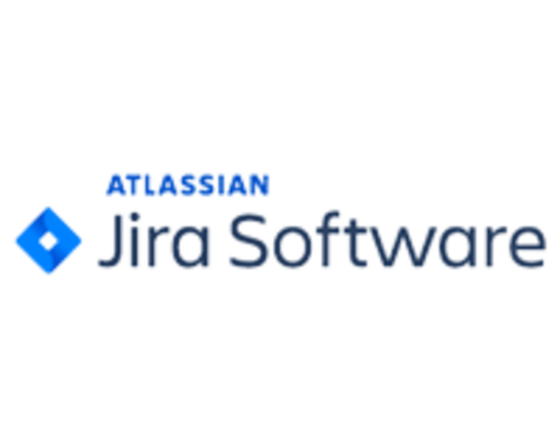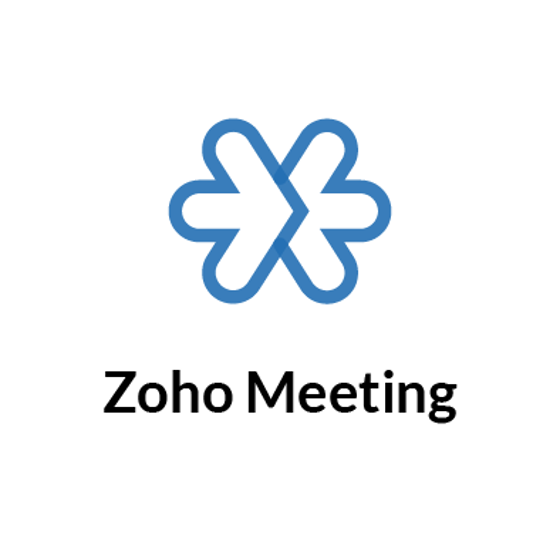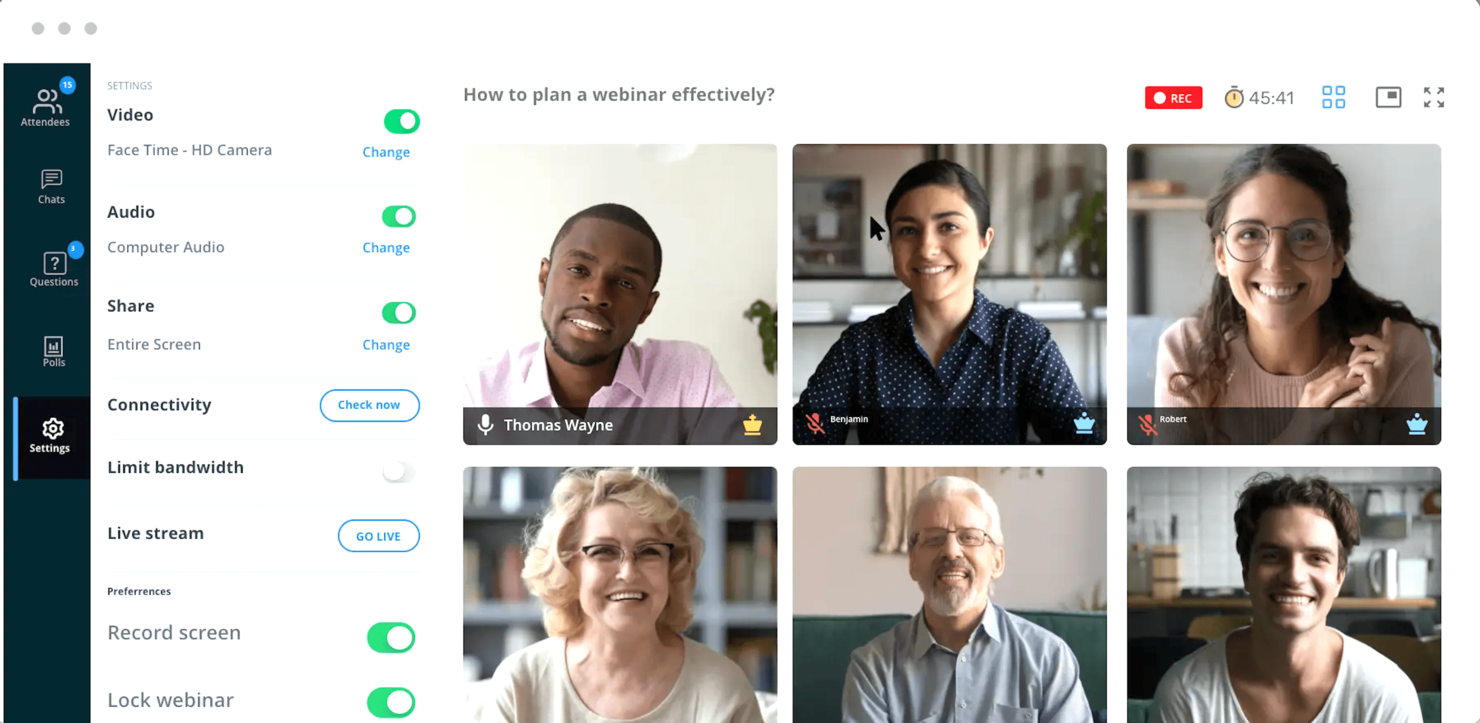10 Best Video Conference Software Shortlist
Here's my pick of the 10 best software from the 21 tools reviewed.
Get free help from our project management software advisors to find your match.
With so many different video conferencing solutions available after the pandemic forced us to be remote, figuring out which is right for you is tough. You know you want to connect people remotely for virtual meetings, discussions, and collaborations but need to figure out which tool is best. I've got you! In this post I'll help make your choice easy, sharing my personal experiences using dozens of different tools with large teams and projects, with my picks of the best video conferencing software.
What is video conferencing software?
Video conferencing software is a tool that facilitates virtual meetings via audio and video. It connects individuals or groups globally, fostering effective communication and collaboration.
With features like screen sharing, session recording, chat, and multi-platform access, video conferencing software helps save time, enhance communication, and foster teamwork.
Overviews Of The Best Video Conferencing Software
Here’s a brief description of each of the best video conferencing software that are featured on this top 10 list.
Zoho Meeting is a versatile web conferencing solution that lets you host meetings and webinars. Collaborate through video meetings with up to 250 participants. Share your screen, share files, and communicate through chat.
You can also host webinars with up to 3000 participants. Launch live polls, use hand raises, and also control who attends your webinar through registration moderation.
Zoho meeting lets you share your screen, use a whiteboard, record sessions, chat with participants, choose a virtual background, and much more.
If you want to host an event for a bigger audience, Meeting can connect to your Google account to enable YouTube live streaming! This will definitely expand your reach and host enterprise-level webinars with ease.
Zoho Meeting has a free version with up to 100 meeting participants. Paid plans start at $3/host/month with a 10-participant minimum and a 14-day free trial.
RingCentral Webinar is designed to make video conferencing a whole lot easier for remote teams. It's a part of the RingCentral suite, which is known for its robust communication tools.
Why I picked RingCentral Webinar: It's one of the most reliable video conferencing tools I've come across. It's not only the great video quality, but also the overall user experience. It's easy to set up, manage, and participate in webinars, which is a big plus for remote teams that need to stay connected and collaborate effectively.
RingCentral Webinar Features and Integrations:
Features that make RingCentral Webinar a cut above the rest include the ability to host webinars with up to 10,000 attendees, which is impressive. It also offers features like screen sharing, interactive polls, Q&A sessions, and even a 'raise hand' option for participants. Plus, it has a built-in analytics tool that gives you insights into attendee engagement and webinar performance.
Integrations include Marketo. They also have an API.
Pricing starts at $20/user/month and they offer both a 30-day free trial and a free demo.
Used by the likes of Shopify and Trello, Whereby is a video communication service that launched in 2013 and was acquired by Videonor in 2017. Their selling feature is video calling without the need for downloads or even log-ins for guests, so it can be used right in a web browser.
Whereby was ranked #1 easiest to use on G2 Crowd and we agree; the no download, no log-in feature is true to its promise to make using the tool quick and easy from the get-go. They scored highly in the Usability department because of this.
Integrations include Google Docs, Trello Boards, YouTube, and Slack.
One con is that certain integrations are limited to business and pro accounts only, meaning that you would be forced to upgrade even if you don’t need the increased user limits and other additions.
Whereby starts at $6.99/month and has a freemium version for 1 user.
Google hangouts is a communication tool designed, as the name suggests, by Google and is a product housed within the G Suite package of solutions. This software has two primary components: Google Hangouts Meet (video-based) and Google Hangouts Chat (text-based).
Obviously, free-to-use software appeals to the Value for Cost segment of our evaluation criteria; Google Hangouts is also robust enough to satisfy most small business needs plus it’s easy to get started using.
Integrations include other Google software, like Gmail, Google Docs, and so on. Additionally, third-party services can be connected through Zapier or by using Google’s designated API.
The con of using a free video-conferencing tool is always that it will have paid-tools with a deeper expanse of features, or a more specific niche, and Google Hangouts is no exception. You may experience some connectivity issues, with audio echoing or not connecting right away.
Google Hangouts is free to use.
Livestorm is a web-based communication and conferencing platform that enables teams to create a complete video communication strategy.
The tool is geared towards marketing, sales, customer success, or HR teams, and allows teams to create online events for their audiences. Livestorm can accommodate meetings, webinars, conferences, online training courses, podcast interviews, product demos, and more.
The tool is browser-based and teams can access it from a variety of devices. Other notable features include the ability to create custom landing pages; send promotional emails and reminders; host engaging online events with integrated chat, polls, and Q & A functionalities; and analyze event performance through an advanced analytics dashboard.
Livestorm offers a free plan that includes limited functionality, and paid plans start at €89 (~$108 USD).
Pros and cons
Pros:
- Can be used on desktop and mobile without download
- Advanced dashboard with features for promoting, hosting, and analyzing events
- Integrates with a variety of apps including HubSpot, Salesforce, Pipedrive, and more
Cons:
- Performance is dependent on a stable internet connection
- Price point is higher than others on this list
Microsoft Teams is a project management solution that includes robust features for video calling and conference calls. They have account options for business use, educational use, and personal use, meaning there is a lot of flexibility for interested parties.
A stand-out feature of Microsoft Teams is their ability to gamify video conferencing; users will experience fun additions to the calls and chats, from GIF uploads to Snapchat-esque filters (yes, turning yourself into a potato is an option).
Integrations include other Microsoft software, like Word, Excel, Outlook, and Publisher, as well as third-party apps like Stack Overflow, LizardOpenDataBot, Skooler, Coreview, LeaveBot, Remind, GTMHub, and many more free and paid options that can be viewed in their Marketplace.
Microsoft Teams lost a few points in UX because of some navigation and clutter issues, resulting in decreased usability. The desktop app tends to have sluggish performance and it can be cumbersome to locate the latest version of any file.
Microsoft Teams starts at $4/user/month and has a free 30-day trial as well as a freemium plan available.
Cisco Webex has a range of solutions for a quick audio conference call or a full-fledged video conference with multiple locations or offices. This tool offers conference calls, screen sharing, support and storage, and an unlimited number of meetings no matter the plan you choose.
The quality of the live video and audio components is good and the bandwidth of the software is relatively low so you can avoid sputtering on a good internet connection. Integrations with Outlook and Gmail make adding web meetings to those respective calendars painless.
Integrations include Outlook, Google Drive, Github, Office 365, Salesforce, and Gmail.
Connecting through a browser was a challenge; mostly, the software will invasively prompt you to download the extension or entire application. This is fine if it’s your conference software of choice but they lost some marks in Usability because it can be hard to onboard new callers.
Cisco Webex offers custom pricing upon request, as well as a free demo.
Join.me offers video bubbles (floating visual images of you and the people you are meeting), local conference numbers in the U.S. and 50+ countries, optional toll-free numbers, and audio controls for meeting hosts such as Active Speaker, Individual Mute, and Roll Call.
Join.me scored well in the Usability segment of the evaluation criteria because it is quick and intuitive to get set-up and their free trial lets you make an account and host a meeting immediately. Swapping between presenters is easy, even for non-tech-savvy users.
Integrations include Outlook and Google Calendar, Trello, Slack, G Suite, HipChat, HubSpot, Highspot, Salesforce, Octiv, DocSend, Yesware, and more through either Zapier or their developer API.
A few cons to note: there was some lag noticed during video calls, perhaps more so than other items on this list. Additionally, the “video bubbles” that are pegged as a feature might be cumbersome for those who want larger images or are used to square frames.
Join.me starts at $10/month and has a free 14-day trial.
Adobe Connect is video conferencing and chats software with tools for online meetings, webinar solutions, and/or visual classroom solutions, depending on your company needs. The basic plan for meetings includes rich recording and editing tools and included storage and VoIP.
Adobe goes above and beyond for online meeting software, offering smart tools like chats and polls, video editing options, media sharing, on-demand recordings, and more. If you want a tool that lets you think outside of the box for web meetings, this could be it.
Integrations include Countdown Timer, Adobe Connect Clock, Randomizer, Custom Survey, and Polling Pod, Vantage Point, YouTube Player, StickyNotePages, UpVote, Talking Stick, Stage Lights, Star Rating, Canvas LMS Integration, SAP Enterprise Learning Integration, ScheduleOne, and even games like Odds and Evens or Tic Tac Toe. It's compatible with Windows, Mac, and Android.
The learning curve for Adobe Connect, like much of Adobe’s software, has a steep learning curve; this tool is better for experienced AV users or at least a team with a robust IT department. Thus, they lost some marks in the Usability section of the evaluation criteria.
Adobe Connect starts at $50/month and has a free 90-day trial.
Microsoft Teams has now started to replace Skype for Business Online as Microsoft’s professional online meeting solution. They are a one-in-the-same tool but with a new branding angle; it offers instant messaging, video conferencing, calling, and document collaboration.
Skype for Business (via Microsoft Teams) is a great low-cost tool with a freemium version available for the benefit of startups and small businesses; they score favorably in the Value for Cost section of the evaluation segment.
Being a Microsoft product means that Skype is designed to easily integrate with other MS software.
One con is occasional stability issues of the software, be it video or audio not connecting even on a strong internet connection, or lost chat histories, delayed or disappeared notifications, and so on.
Microsoft Teams (which includes Skype for Business) starts at $5/user/month and has a freemium version of the software.
Plus: Video Conferencing Hardware
- Poly G7500
- Logitech Group Video Conferencing Bundle
- Poly Studio
- Logitech Meetup
- Logitech ConferenceCam Connect
- Logitech Conference Cam
- Owl Labs
- Logitech Brio Webcam
Hardware Comparison Criteria
As you will see, we have a list of recommended video conferencing hardware below, as well. The evaluation criteria for that is slightly different, obviously, so I’ve done a brief outline of what I am looking for here:
1. Usability: Is the hardware easy to assemble, connect, and use?
2. Accessory Connectivity: Can other hardware be easily plugged in and used with the device (extra mics and cameras, as so on)?
3. Features & Functionality:
- Camera Stability – Does the camera have the means to produce sharp, clear focus despite different actions occurring on the scene? Does it recover seamlessly from the occasional bump or readjustment?
- 4K or HD video quality – Is the produced video of high quality? Is the quality maintained through the length of the call?
- Number of Participants – What is the average number of participants the hardware/camera can handle?
- Group Framing / Speaker Tracking – Does the hardware have a way to track the current focus of the meeting by movement, voice, or through manual input?
4. Integration: Does the hardware work with most of the popular video conferencing software on the market?
5. Value for $: How appropriate is the price for the features, capabilities, and use case?
Overviews Of The Best Video Conferencing Hardware
1. Poly G7500 – Best for digital whiteboarding.
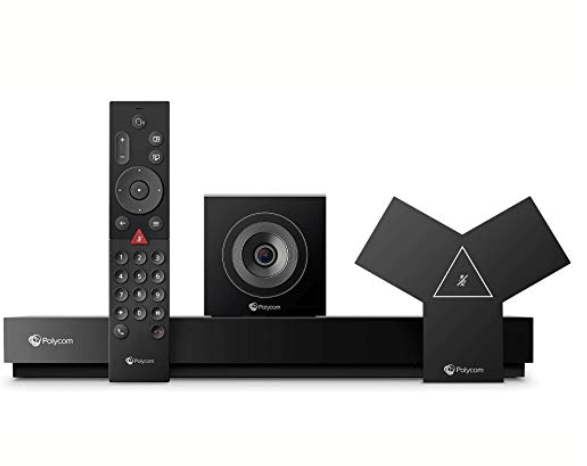
Includes Ultra HD 4K camera, built-in noise cancellation tech, and customization options.
This conference room system is made by Polycom and is a good fit for rooms that fit between 4-12 people, though certain configurations may allow for a larger audience. This package touts an EagleEye Cube 4k Camera with smart auto-framing technology.
This tool boats a native integration with Zoom, available without the need for additional computers in the conference room. This could be a pro for anyone who already uses Zoom or is undecided about their software choice.
The Poly G7500 evaluated favorably in Accessory Connectivity, as you can add or subtract different accessories within the bundle, changing the overall cost and number of functionalities covered.
The Poly G7500 starts at $4599.
2. Logitech Group Video Conferencing Bundle – Best for audio/video conference bundling.
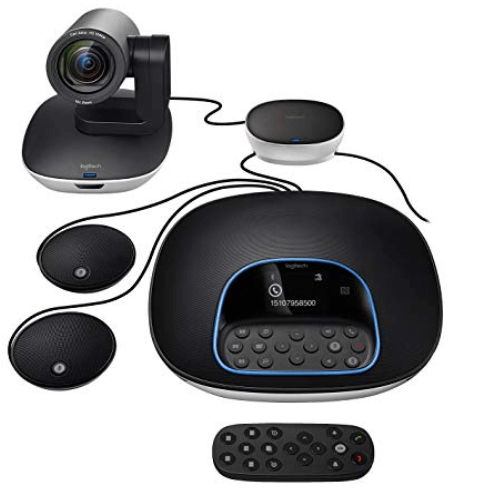
Works with most UC, video conferencing, and cloud communication apps.
The Logitech Group Video Conferencing Bundle can launch video meetings with a plug-and-play USB connection and is optimized for up to 20 participants. This system offers a D 1080p video with autofocus, digital pan/tilt/zoom, and premium Zeiss-certified optics. The zoom feature and stability of the camera are some of this hardware’s best features. It is compatible with all major video conferencing solutions, like Zoom, Gotomeeting, Web-tex, and Skype.
This tool scored highly for its Number of Participants features, which allow the camera and microphone to accommodate up to 20 individuals per meeting room, which is substantially more than other competitors.
The Logitech Group Video Conferencing Bundle starts at $1299.
3. Poly Studio – Best for active speaker tracking.
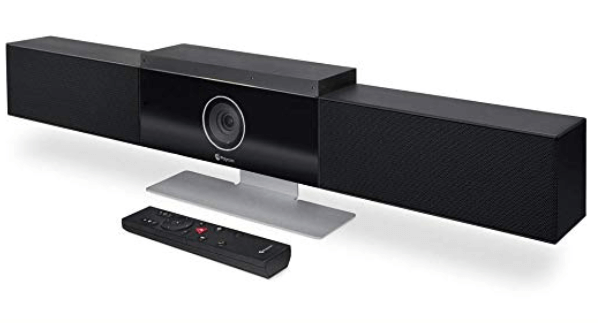
Includes automatic people framing and active speaker tracking for ease of use.
The Poly Studio is a business-class video conferencing hardware solution with automatic group framing and speaker tracking. This hardware works best for any home office, huddle room, or small conference rooms with automatic group framing and speaker tracking. Poly is a merging of technology companies Polycom and Plantronics and the Poly Studio is their answer to a video conferencing solution, boasting connectivity with Cisco Webex Meetings, Hangouts, Microsoft Teams and/or Zoom.
This tool evaluated well in the Features – Camera Stability segment of the evaluation criteria, mainly because the speaker tracking works well with the camera tracking the current source of voice/focus within a few seconds of speech.
The Poly Studio starts at $1120.
4. Logitech Meetup – Best for integration with any video conferencing software.
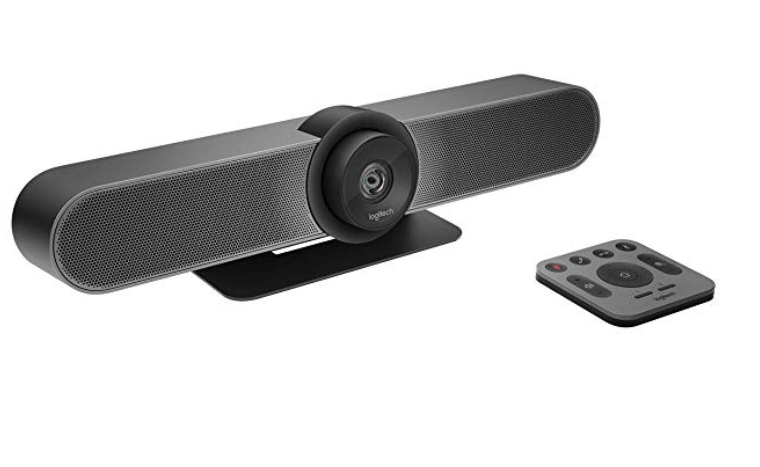
Logitech Meetup can work with any video conferencing software application and cloud service.
This software is compatible with Logitech’s premier ConferenceCam and is specifically designed for business grade video meetings in huddle rooms and small conference rooms. Features include a built-in audio system that features 3 microphones and multiple video resolutions, including ultra 4k, 1080p, and 720p. A stand out feature of this hardware is the wide-angle camera, which can easily capture the length of a conference room without warping. All of this for a very reasonable price, making it very suitable for small 5-6 person groups.
The flexibility of the video resolutions scored this tool highly in the Features – Video Quality segment of the evaluation criteria; everyone using this tool should be able to find a resolution that works for their purposes and with any preexisting hardware.
The Logitech Meetup starts at $899.99.
5. Logitech ConferenceCam Connect – Best for small teams.
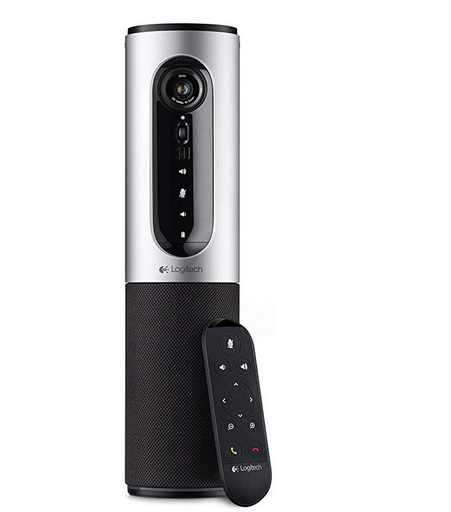
1080p video with autofocus and digital pan, tilt, and zoom with noise cancellation audio.
The Logitech ConferenceCam Connect is a portable video conferencing solution with a sleek, easy to carry design. This tool also lets you connect mobile devices to the camera in order to display presentations and other content on a TV screen from a tablet or smartphone. The easy portability of this hardware is easily one of the most interesting features, as anyone who needs something “on the go” will find this possibility endlessly helpful. It is small enough to fit in a suitcase for business trips, too.
The Logitech ConferenceCam Connect scored highly for Usability, as it is designed to move with its user and is capable of a quick, easy set-up in changing remote locations for those on the go.
The Logitech ConferenceCam Connect starts at $499.99.
6. Logitech Conference Cam – Best for larger organizations.
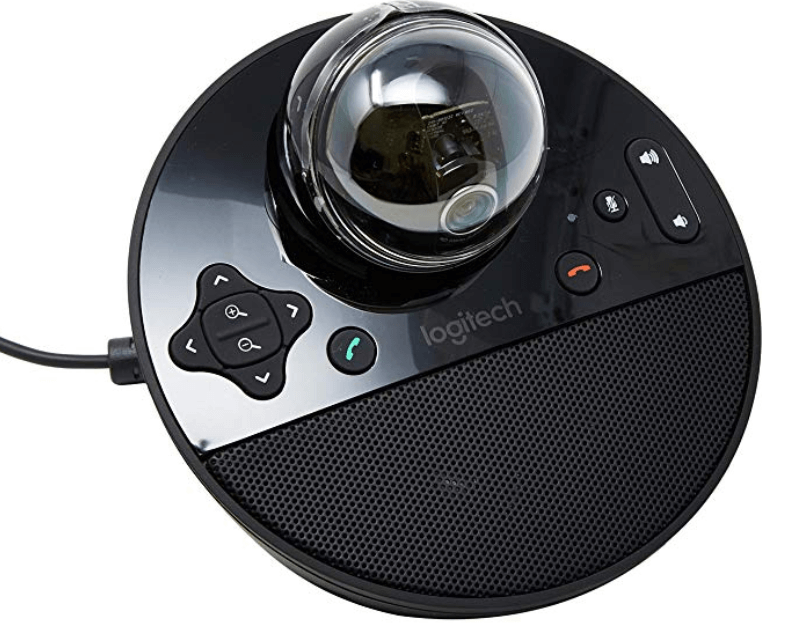
A freestanding wide-view HD webcam with an enterprise-quality speakerphone.
The Logitech ConferenceCam features a microphone bandwidth of 200 Hz – 8 kHz; 720p HD video calling (up to 1280 x 720 pixels); 78-degree field of view and 180-degree remote-controlled video pan, tilt, zoom; and Omni-directional mic pickup and echo cancellation. Logitech works with most any video conferencing application or meetings service, including Skype for Business, BlueJeans, Broadsoft, Cisco Jabber, Cisco WebEx, Fuze, LifeSize Cloud, Vidyo, and Zoom—a huge plus for flexibility.
The Logitech Conference Cam scored well in Value for Price, as it is relatively inexpensive, as well as earning marks for general Connectivity Features that ensure it works with all popular web video software.
The Logitech Conference Cam starts at $248.99.
7. Owl Labs – Best for 360-degree video conferencing.
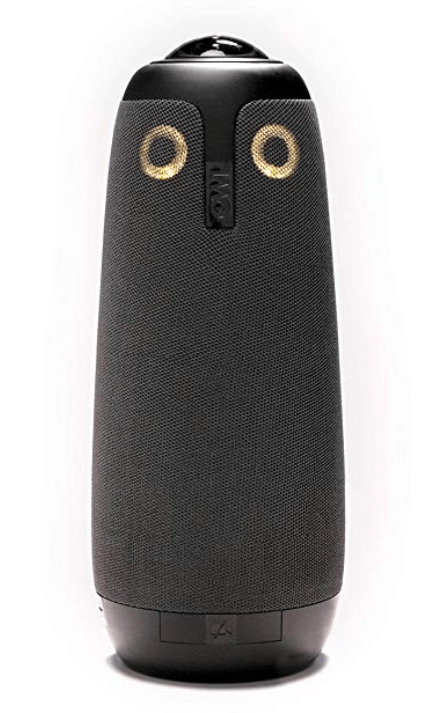
A plug-and-play 360° smart video conferencing camera with no downloads or installs.
The Owl Labs Meeting Owl is a 360° smart video conferencing camera that has the capability to highlight and shift focus to different people in the room when they speak. It combines mic, camera, and speaker into one device and eight microphones pick up everyone within 12 feet. Flexible and affordable, Owl Labs easily plugs-and-plays with common video conferencing software like Zoom, Meet, Skype, Slack, BlueJeans, GoToMeeting, and more. Owl Labs scores well in the evaluation criteria for Value for Price and Connectivity, as it is relatively inexpensive and connects easily with all popular web-based video conferencing software.
Owl Labs starts at $799.
8. Logitech Brio Webcam – Best for zoom capabilities.
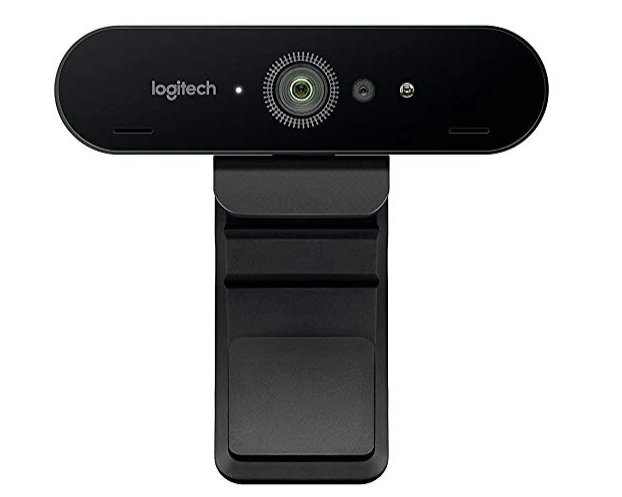
Logitech Brio Webcam has a built-in dual Omni-directional mics with noise cancellation.
The Logitech Brio Webcam weighs approximately 336 g and sports dimensions of 2.5 x 2.5 x 10.2 cm; it fasteners atop most computer monitors at the top of the screen for an easy, portable video conferencing solution with a 4k image sensor, high dynamic range (HDR), and autofocus. This tool is certified for skype for business and cisco, and compatible with popular video meeting apps including Zoom, WebEx, BlueJeans, Facebook messenger, and more.
This hardware scored highly in the Value for Price section of the evaluation criteria along with Usability thanks to the flexibility and portability of the tool.
The Logitech Brio starts at $399.
The Best Video Conferencing Software For Remote Teams Summary Chart
| Tools | Price | |
|---|---|---|
| Zoho Meeting | From $3 USD/host/month for meetings with 10 participants | Website |
| RingCentral Webinar | $20/user/month (billed annually) | Website |
| Whereby | From $6.99/month | Website |
| Google Meet | From $4.20/user/month | Website |
| Livestorm | From € 89/month | Website |
| Microsoft Teams | From $4/user/month | Website |
| WebEx | Pricing upon request | Website |
| join.me | From $10/month | Website |
| Adobe Connect | From $50/month | Website |
| Skype for Business | From $5/user/month | Website |
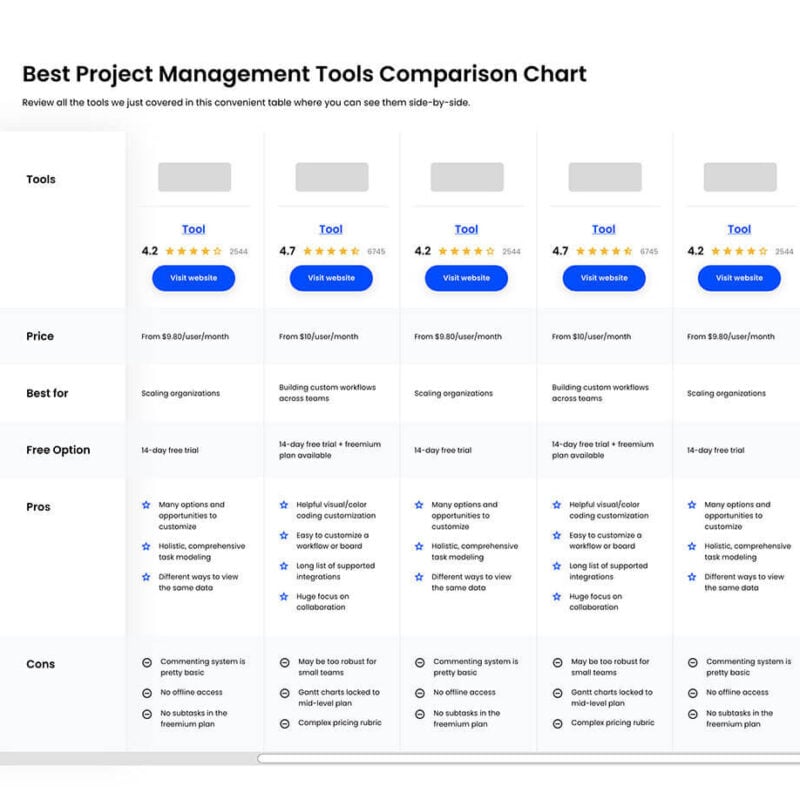
Compare Software Specs Side by Side
Use our comparison chart to review and evaluate software specs side-by-side.
Compare SoftwareOther Video Conferencing Tools Options
Here’s a few more that didn’t make the top list. If you need additional suggestions for the best video call app, check these out.
- uMeeting
Best for webinars
- GlobalMeet Collaboration
Best for in-browser video conferencing
- Ryver
Best for third-party integrations.
- GoToMeeting
Instantly join, host, or manage a video, audio, or web meeting from anywhere.
- Flock
Video call directly from within a chat or channel and share your screen to get into details.
- Zoom
Host up to 100 video participants and an unlimited number of meetings with their free plan.
- Lifesize
Host free and instant video calls with your team right from your phone or browser.
- Everytale
An all-in-one virtual events platform bringing people together for interactions around the world.
- BlueJeans
Builds meeting highlights and transcription plus live meeting analytics and alerts.
- Pexip
Dynamic video collaboration to schedule and host meetings instantly on any device.
Related Read: 10 Best Remote Project Management Tools Of 2023
Video Conferencing Software Comparison Criteria
What are we looking for when we select video conferencing software for review? Here’s a summary of my evaluation criteria:
1. User Interface (UI): Is it clean and attractive?
2. Usability: Is it easy to learn and master? Does the company offer good tech support, user support, tutorials, and training?
4. Integrations: Is it easy to connect with other tools? Any pre-built integrations, such as calendar integrations?
5. Value for $: How appropriate is the price for the features, capabilities, and use case? Is pricing clear, transparent, and flexible?
Video Conferencing Key Features
Here are a few key features any good video conferencing tool should have.
- Interactivity Features – Does the tool allow ways to get your attendees involved in the presentation like polls, surveys, or a blackboard?
- Accessibility – Does the tool offer options for recording/playback, subtitles, closed captioning, screen capture, note-taking, and so on?
- Document sharing/collaboration options – Can users share, edit, mark up, and save documents within a collaborative space? Do these tools work seamlessly with video software to enhance the online meeting experience and team collaboration?
- Ease of Searchability – Whether it’s sifting through your contacts or looking over chat notes or call history, does the software make it easy to do so?
Teleconferencing Software FAQ
Find answers to common questions other people ask about this topic.
Is it a good idea to have remote workers?
Contingent workers are a valuable asset and 88% of hiring managers report increasing comfort with installing remote workers in even more senior positions. As hybrid teams become more common, there is a need for the right communication and collaboration tools to bring people together.
According to the Owl Labs State of Video Conferencing 2019 report, video conference meetings are the preferred method of communication when in-person meet-ups are not possible. That means that video conferencing is now the favored method of communication over email, instant messaging, and phone calls.
What is video conferencing equipment?
In order to host or participate in a video conference, you will need a set of video conferencing equipment. The equipment needed will depend on the type of video conference you want (number of participants, type of video stream, etc.). Common video conferencing equipment includes a webcam, headset, microphone, a broadband connection, monitor or TV display, and your choice of web conferencing software.
What are some alternatives to Skype?
Skype is one of the more well-known video conferencing tools but it’s not the only one available. You can also try these alternatives to Skype: Google Hangouts, Microsoft Teams, Adobe Connect, RingCentral, Cisco Webex, Join.me, Ryver, and more.
What is the best free online meeting software?
Working on a tight budget? Here are some free teleconferencing tools you can rely on Google Hangouts, Zoom (free plan), Skype, Free Conference Calling, GoToMeeting (free), Apple FaceTime, UberConference, TrueConf Online, Appear.in, Slack Video Calls, Facebook Live, YouTube Live, and more.
Not looking for video chat apps? Check out our other lists of top project management tools:
- If you’re using the popular GoToMeeting, check out my list of good GoToMeeting alternatives and how they compare.
- Here’s a list of mind mapping tools that can help you co-create flowcharts and mind maps live with remote team members.
- In addition to video call apps, you can use different communication tools to sync up team tasks and comms when working remotely.
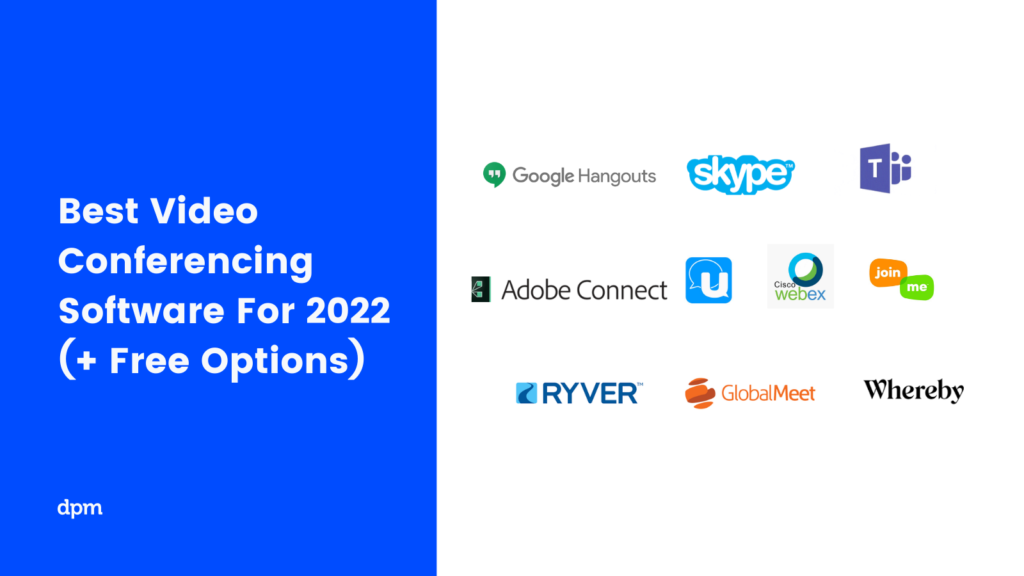
What Do You Think About the Webconference Software and Tools Listed Above?
Meeting face to face is invaluable but sometimes it’s just not possible for everyone to be in the same room. Video conference software saves you the time and cost associated with traveling to meet clients.
Check-in more frequently and with ease to ensure projects stay on track. Videoconference and web conference software can orient your meetings, connect your teammates and partners, and keep everyone on the same page.
Have you tried out any web conferencing tools listed above? What video chat app do you prefer, and why? Are we missing anything from our list? Let us know in the comments below.
Don’t forget to subscribe to the DPM newsletter to stay up to date on all the latest tools and trends in the project management industry.
Also Worth Checking Out: Best Project Management Tools For Remote Teams



